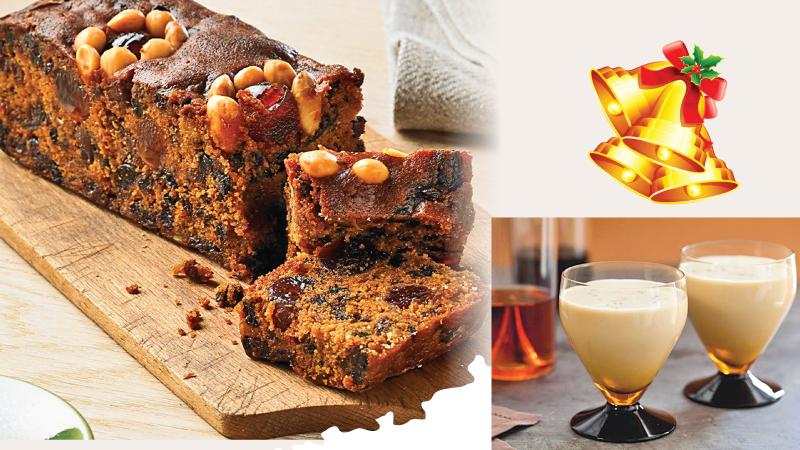
Cakes at Christmas have become a standing order. Children and adults expectantly wait to bite into a juicy slice of ‘rich cake’ topped with almond infused parchment icing. Experts assume that the rich cake has its origins from a Scottish cake the Whiskey Dundee. The cake is made up of almonds, currants and sultanas with a portion of whisky to enhance the flavour. It was subsequently made commercial by the Keillers Marmalade company. Others argue its origins were from the grand kitchen of Mary, Queen of Scots. An ancient tradition added a few silver coins into the cake for good luck!! With changing eating habits and hurried lifestyles the making of Christmas cake is becoming a challenge to the folks in Colombo, and other parts of the island. New choices include the Yule log.
 There is one man who has excelled as a Pastry Chef for almost 40 years. Gerard Mendis needs no introduction to all of us who enjoy cakes. Having mesmerized guests at the Hilton he moved on to open his own business. Amiable Gerard said, “Cake trends are changing in Colombo during Christmas. We have customers from European backgrounds who prefer the traditional rich cake, while some prefer a different alternative. We strive to balance tradition, in terms of recipes. People don’t make Breuder as they used to”.
There is one man who has excelled as a Pastry Chef for almost 40 years. Gerard Mendis needs no introduction to all of us who enjoy cakes. Having mesmerized guests at the Hilton he moved on to open his own business. Amiable Gerard said, “Cake trends are changing in Colombo during Christmas. We have customers from European backgrounds who prefer the traditional rich cake, while some prefer a different alternative. We strive to balance tradition, in terms of recipes. People don’t make Breuder as they used to”.
Mendis is the man who introduced the German bread like fruit cake Stollen to us local gourmets years ago. He further said, “the cost of imported ingredients has increased our production costs to 33 % yet, I keep only a small margin of profit as we desire to honour our loyal guests”.
Mendis was also concerned about the high prices of cashew nuts and other ingredients, which would make people bake in smaller portions. He opined, “If we are to lure tourists in December we must be able to serve them star class food (cakes) and maintain global standards, it’s not only the glamour of decorations”.
Another person who knows her cakes is Leonie Gerreyn. Having baked Christmas cake for nearly five decades, this grand lady turns out succulent cakes. As I entered her home in Moratuwa the house was full of the fragrant aroma of both, rich cake and the local variant love cake.
Leonie also expresses her concern about the cost of good ingredients. “Back in the day we used to make almost 50 pounds of cake beginning in the first week of November. Now, baking costs have also increased”. This Burgher lady is perhaps the last of a jolly generation who take pride in their culinary heritage. The rich cake becomes rich in flavour as days go by and therefore can at least be kept for more than a month.
She also makes a bread pudding in triple colours. Today, commercial desserts are the easy alternative to young housewives.
Another traditional accompaniment to these cakes is the eggnog, a beverage made with milk, cream, sugar, whipped egg white with a dash of rum or brandy. It became popular since 1693. I just had a delicious glass before writing this, with my friend Praveena Amaratunga at the Hilton.
Continuing this tradition in Sydney, Australia is Padma Ebenezer who is domiciled there for 10 years. I managed to locate her, having eaten many of her cakes in Colombo when she lived here. She joyfully recalls,“I remember making the cakes at home as a child with my mother and sisters, it was fun. Later on I started making by trial and error- we had no culinary lessons.
“Having an electric beater at that time would certainly enhance your baking process. As the years went by the baking systems changed and today we have digital ovens, which bake better. Back in the day we had to line the cake trays carefully with butter.”
She also recalled the fellowship and fun atmosphere that resonated around the kitchen, her husband being one who enjoyed eating the cake along with their two daughters. Again, she is one of the faithful souls who has carried her recipes overseas and sustains the ‘Ceylon’ cake making legacy.
Today, the price of 1 kg of rich cake is 3,500 rupees, and love cake 2,500 rupees for just 500 grams; this is owing to the cost of ingredients. Housewives who baked five kilo cakes are making smaller two kilo cakes. I got the opinion of veteran city hotelier M.Shanthikumar who has seen the evolution of cakes for more than three decades, having travelled to many countries. The prudent hotel director said, “The older generation still prefers the traditional Christmas rich cake, while the younger generation has the choice of the rich cake and other newly created goodies. The new creations still have the same base ingredients. In terms of price the cost is very much high this year, but we have to maintain our standards. Taxes and service charge is also added to the price of the cake and would affect the volume of cake sales”.
Is the rich cake then becoming a luxury item in the yuletide realm? Hence cakes will come and cakes will go, but the Christmas rich cake may survive for at least a few more decades, we hope.
